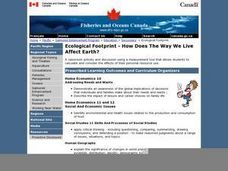Curated OER
Ecological Footprint--How Does The Way We Live Affect Earth?
Students demonstrate an awareness of the global implications of decisions that individuals and families make about their needs and wants. They identify environmental and health issues related to the production and consumption of food....
Curated OER
Fungi - Review and Reinforce
Diagrams of possible fungi life cycles are printed on the worksheet for biology pupils to evaluate. Short-answer questions ask them to explain what a fungus is, how it obtains food, and what would happen if they ceased to exist. The...
California Academy of Science
Composting: A Scientific Investigation: California Academy of Sciences
Garbage, recycle, compost: Does it really matter where we put our trash once we are done? By making detailed observations over seven weeks, kids will see which materials break down naturally to become a healthy part of the soil, and...
Curated OER
Confucianism in a Changing Society
A great lesson promotes thoughtful discussion, global perspectives, and links between economics and culture. Learners view four clips showing how Confucian teachings have shaped Chinese culture and how filial piety plays a role in...
Curated OER
Recycling and Composting
Students set up composting sites that allow food scraps and paper to be recycled by nature. They are introduced to one aspect of recycling; composting. Students see how God recycles as the worms change garbage into something that brings...
Curated OER
Clothes on the Grow
Can you grow clothes? Sure, wool, cotton, and Angora are all natural resources used to make textile products. Learners investigate the differences between synthetic and natural fibers, then consider textile processing careers. They watch...
Curated OER
A Model for Natural Selection- Spaghetti Worms
Does the early bird really get the worm? If so, which color of worm does it prefer? In an exciting and easy week-long field investigation, young field biologists set up a one square meter feeding area for birds. If you have a webcam,...
Curated OER
Prairie Scavenger Hunt
Middle schoolers take a close look at the prairie environment. They identify common plants and animals of the prairie. In addition, pupils work in teams in order to put together a presentation on a certain aspect of the prairie...
Curated OER
Farming: It's a Fact
What does it take to work in agribusiness? Conduct and explorative investigation which describes where our food dollars go, who makes money on what we buy, and jobs related to agriculture. The class plays an interactive game, analyzes a...
MENSA Education & Research Foundation
Pi Day Fun!
In this multi-faceted introduction to pi, participants perform a bevy of pi-related activities. Ranging from measuring household items to singing pi songs and reading pi stories, this fun and non-intimidating resource serves to bring up...
Curated OER
Nutrition and the Media: Cereal Box Consumerism
How many treats do you buy each week? Learners investigate diets and how the media tricks consumers into purchasing unhealthy snacks. They will investigate the designs and logos affiliated with cereal boxes and identify specific phrases...
Curated OER
Earth: Our Big Blue Marble
Students investigate Earth and its resources. In this Earth, space, and nature lesson plan, students collaborate to design presentations on the Earth, its cycles, and how humans have impacted the planet. Images, diagrams, and background...
Curated OER
DNA: Expressions in Agriculture
What is DNA extraction, and can you make a living doing it? Yes, if you are in a biotechnology field. Kids learn about DNA extraction, GMOs, and biotechnology careers. They then watch videos and complete activities to understand the use...
California Education Partners
Cady's Cats
How much can a cat eat? The five-question fraction assessment asks pupils to determine the fractional portion of a food box eaten by cats. Learners show their proficiency in adding and subtracting fractions using several scenarios...
Curated OER
Is There Seaweed/Algae in Your Food?
Students discover that seaweed/algae is a small part of the resources the oceans provide. By investigating common household products, students discover that human senses are not enough to detect the presence of seaweed/algae in food.
Curated OER
Hands of Doom
Students discuss the four essential step used for safe food handling: clean, separate, cook, and chill. They identify the bacteria that can cause food poisoning, practice how to properly wash hands before and after handling food,...
Curated OER
There Are Algae in Your House!
Students complete a worksheet at home stating what types of food they have at home with algae in it. They, in groups, compare with each other what they have on their worksheet.
Curated OER
Nutrition
Third graders explore the components of a balanced diet and practice making healthy diet choices. They discuss health-enhancing choices. Students investigate the food pyramid and how to use it to make educated menu decisions. They...
Curated OER
Summer Lessons: dairy
Students learn about dairy products by sampling food, making food, going to the grocery store, and more. In this dairy lesson plan, students also have coloring pages to complete.
Curated OER
Lower the Trans and Increase the Omega-3s
Students identify the health risks associated with trans fats. In this adult health lesson, students examine food labels for hydrogenated oils content. They discuss the benefits and sources of omega-3s.
Curated OER
Photosynthesis
Fourth graders discuss and identify the components of photosynthesis and the products of this process. They participate in a class discussion about the importance of oxygen, and in small groups act out the process of photosynthesis. ...
Curated OER
Super-sized! Is it really a deal?
Students discuss the pros and cons of eating in fast food places. In this adult health lesson, student examine the fat and calorie content of fast food meals. They share ways to make healthy food choices.
Curated OER
Mathematics Through Nutrition
Students plan a meal including shopping, preparing and meal and serving it. They become aware of different foods from different ethnic backgrounds and describe the displays in the store and why the items are displayed as they are.
Curated OER
The Energy Equation
Students explore human energy components. In this personal health lesson plan, students determine how food, sleep, and exercise impact human energy levels as they play BAM! Body and Mind interactive games. Students create motivational...

























